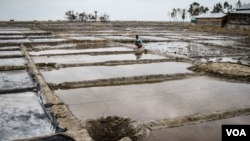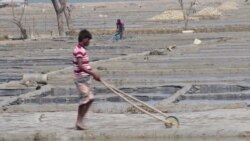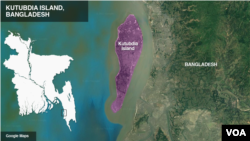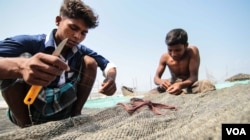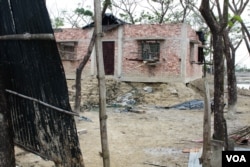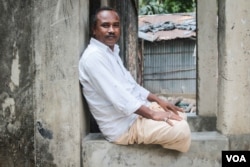Off the coast of Bangladesh, a small island is being battered by cyclones and devoured by the sea.
Kutubdia has been the source of a mass exodus as communities destroyed by the changing conditions flee the island in search of a new life.
And for those paying attention, Kutubdia is not just an island — it it a bellwether, and a warning, for the low-lying nation where millions are threatened by the effects of climate change.
Watch: Island of Kutubdia offers bleak vision of future
A disappearing island
“I remember from my younger years the village was full of greenery, with trees, vegetables and paddy fields,” recalls Rozina Khatun, who now looks out across a very different landscape.
On this part of Kutubdia, the greenery and the paddy fields have largely gone —destroyed by floods; they have been replaced with salt fields instead, which are themselves now often ruined by floods.
Where there were once villages, recently built shacks now pepper the landscape.
The speed with which the rising seas have encroached on the island is unusual, but the new buildings are testament to a far swifter destructive force.
Though the region has always been afflicted with deadly tropical cyclones, a World Bank study found that higher surface temperatures in the Indian Ocean were likely to increase their frequency and strength.
Last May Cyclone Roanu tore path through Sri Lanka, India and Bangladesh, destroying around 125,000 homes and structures along the way.
Khatun's home was one of them, and though his family escaped with their lives, they lost everything.
Over recent decades, tens of thousands of inhabitants have left the island.
“Those who had money have left this place but those who are still here are living under poverty line,” Khatun added. “If I had money I would leave, but I am still here.”
Buying from elsewhere
Saber Ahmed also is attempting to rebuild his life on Kutubdia.
His fishing boat was destroyed in the cyclone, which he and his family survived by climbing trees.
In 1991, when sea levels were already beginning to rise sharply, his wife and child were killed in another cyclone that caused thousands to flee.
And longer rainy seasons have made it harder to dry the fish he has caught.
On an island once rich in paddy fields, now he has to buy rice from off the island.
"Before, we cultivated a lot and wanted for nothing," he said. "But now, as we cannot cultivate anything we have to buy in things from elsewhere."
What is happening in Kutubdia is driven by a number of factors, including a naturally quick rate of erosion.
Beyond Kutubdia
But the role of climate change means it is predicted to play out on a national scale — with potentially devastating consequences. Bangladesh is seen by many experts as the most vulnerable country in the world to climate change over the coming decades.
Estimates vary, but according to a U.N. report released last year up to 25 million people in Bangladesh are at risk from the impact of rising sea levels.
This partly stems from the long stretch of coastal land around the Bay of Bengal as well as the fact that two thirds of the country is less than five meters above sea level.
Across Bangladesh, a series of measures have been taken in response, including siren systems giving advance warning of coming cyclones. But while Kutubdia's cyclone shelters have helped save lives, shoreline sea defenses are impermanent and regularly breached.
Mohammed Alam works for Coast, an aid organization that focuses on assisting those whose lives have been hit by climate change. As part of its work, it has provided financial help to Ahmed Saber.
Alam called on the Bangladeshi government to do more to educate people about the problems caused by climate change. Repeated attempts by VOA to contact the department of environment and forests failed to elicit a response.
But he also emphasized that a global, not just local, response was needed.
“I think that the developed countries are the most responsible for climate change and they need to support this effort,” he said, referring to global agreements to cut emissions blamed for climate change.
Many of the homes on Kutubdia are not even connected to the power grid, and Bangladesh's emissions pale in comparison to many other — less populous — countries.
A distant memory
Noting with disdain the decision by U.S. President Donald Trump to scrap many of former President Barack Obama's climate-related policies, he added "the rights of undeveloped and developing countries are being despoiled by the developed countries."
If the coming years do produce potentially millions of so-called climate refugees in Bangladesh, then they will be following in the footsteps of Muhammed Nuruddin.
Nuruddin recalls seeing with dread the sea levels rise toward his house. He fled Kutubdia with his family in when he was eight years old in 1988.
He remembers the depression of his father, a respected fisherman on the island who had to turn to manual labor on the mainland, as his family struggled to find a place to re-establish.
Half a decade later, however, they found a spot near the popular mainland beach town of Cox's Bazaar, further south down the Bangladesh coast.
Since then, Kutubdia's shoreline has receded, so more families have flocked to the area, turning what was a cluster of families into a community of thousands.
Despite his happiness, he remains haunted by what happened in Kutubdia.
"The lower land will be under sea one day," he warns, "because of climate change."




